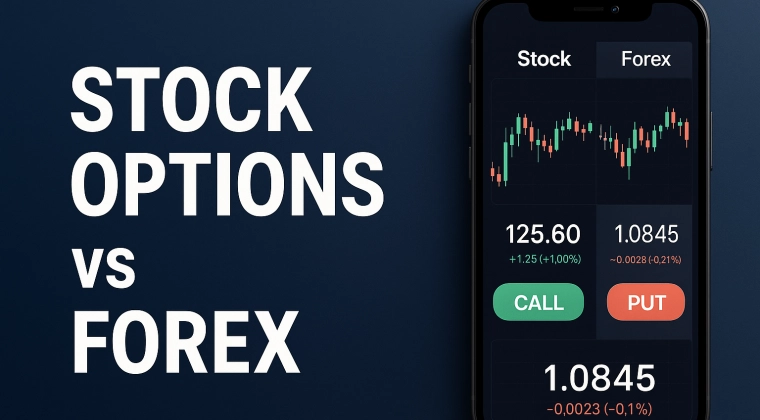
Scarica l'app
-
- Piattaforme di trading
- App PU Prime
- MetaTrader 5
- MetaTrader 4
- PU Copy Trading
- Commerciante web
- PU Sociale
-
- Condizioni di Trading
- Tipi di conto
- Spread, Costi e Swap
- Depositi e Prelievi
- Tariffe e spese
- Orari di Trading

Scarica l'app

If you’re looking to get into trading, two of the most popular markets you’ll come across are stock options and forex.
Both let you speculate on price movements, but they work very differently, and knowing which one suits you comes down to your goals, risk tolerance, and how hands-on you want to be.
Whether you’re just starting or considering a new venture, this guide will break down the key differences, enabling you to choose with greater confidence.
Stock options give you the right, but not the obligation, to buy or sell a specific stock at a fixed price before a set date.
You’re not buying the stock itself; you’re trading on its potential to move up or down. Here’s how it works:
If the stock price moves in your favour, your option could become valuable.
If it doesn’t, the contract may expire worthless, and you lose the premium you paid.
Options trading can be used to speculate on price swings or to hedge other investments in your portfolio; it all depends on how you want to use it.
Forex trading is the act of exchanging one currency for another, and it happens in the largest and most liquid financial market in the world. It’s fast-paced, accessible, and runs nearly 24 hours a day.
Here’s what you need to know:
Most forex trading occurs through online platforms or brokers, and it’s popular among both beginners and experienced traders due to its flexibility and global scope.
| Stock options | Forex | |
| What you’re trading | Contracts based on company shares | Currency pairs (like EUR/USD or GBP/JPY) |
| Do you own the asset? | No, you’re trading a contract, not the stock itself | No, you’re speculating on exchange rate changes, not holding real currency |
| When can you trade? | During exchange hours; each option has an expiry date | Almost 24 hours a day, 5 days a week |
| How liquid is the market? | Liquidity varies depending on the stock | Very high, especially with major currency pairs |
| Can you use leverage? | Yes, but it’s often limited and more tightly regulated | Yes, usually with higher leverage options available |
| How easy is it to get started? | Usually requires a broker and some extra approval | Easier to access with most standard trading accounts |
| Risk management tools | Built-in strategies like hedging can help manage risk | Risk tools depend on your strategy and platform features |
In short, stock options offer more complex strategy choices and can be great for hedging if you know what you’re doing.
Forex is a fast-moving, accessible market that is ideal for those seeking flexibility and global exposure.
The best fit depends on how you like to trade and how hands-on you want to be.
There’s no one-size-fits-all strategy in forex.
The market operates almost around the clock, allowing traders to employ a range of styles depending on their preferred time frame and risk tolerance.
Many forex traders combine charts, technical tools, and economic news to shape their decisions.
Spot trading, where trades are settled almost instantly, is particularly common for those seeking to capitalise on short-term price fluctuations.
Options trading opens the door to various strategic setups.
Because you’re trading contracts instead of actual shares, you can customise how much risk and reward you’re willing to take on.
Each strategy suits a different outlook and level of risk tolerance.
Some require more capital upfront, while others offer significant upside potential if you get the direction and timing right.
But like all trading, options come with risk, especially if you’re not keeping a close eye on how your trades are set up.
Planning and understanding your strategy matter just as much as the trade itself.
Trading forex or stock options can offer significant opportunities, but they also come with real risks.
Understanding what you’re getting into is just as important as knowing how to trade.
Whether you’re trading currencies or options, remember: you’re speculating on price movements.
You don’t own the actual currency or shares, and losses are possible, sometimes even greater than your original investment.
Always know your limits, use risk management tools, and only trade what you can afford to lose.
Here’s how stock options and forex stack up, depending on what matters most to you:
| Caratteristica | Stock options | Trading sul Forex |
| Liquidità | Moderate, depends on the stock and option activity | Very high, especially with major currency pairs |
| Market hours | Limitato alle ore di scambio | Nearly 24 hours a day, five days a week |
| Leva | Available, but more tightly regulated | High leverage is more common |
| Complexity | Higher, lots of jargon and contract details to understand | Moderate, needs focus, but more straightforward than options |
| Flessibilità | Wide range of strategies, including advanced setups like spreads | Good for fast moves, but fewer strategic combinations |
| Proprietà | No actual ownership of the stock | No actual ownership of the currency |
| Accessibilità | May require extra approval from your broker | Easy to access through most online platforms |
| Built-in safety net | Some strategies (like protective puts) help manage risk | Risk must be managed manually through stop-loss and position sizing |
The bottom line is that Forex is generally more accessible and faster-paced, making it appealing for beginners.
Stock options offer more structure and strategic depth, especially for managing risk, but they come with a steeper learning curve.
The best choice depends on how much control, complexity, and time you’re comfortable with.
Choosing between stock options and forex really comes down to how you like to trade and how much time and risk you’re willing to take on.
There’s no one correct answer, just what works best for you.
Both markets take time to learn, and both reward careful planning and risk management.
The first step? Find a trading platform that supports your learning curve and lets you practise safely.
PU Prime offers a flexible platform where you can trade forex and CFDs with real-time data, risk tools, and even a demo account to practise first. It’s a smart way to get started, without jumping in blind.
Do I actually own shares or currency when I trade options or forex?
No. With stock options, you’re buying the right to trade shares at a set price, not the shares themselves. In forex, you’re speculating on currency values without holding the actual currency.
Which market is bigger: stocks or forex?
The forex market is significantly larger in terms of daily trading volume. It operates almost nonstop and is recognised as the most liquid financial market in the world.
Is forex trading riskier than options trading?
Both carry risk, just in different ways. Forex is fast-moving and heavily leveraged. Options can be complex and time-sensitive, especially if a trade doesn’t go your way before expiry. The key is understanding what you’re trading and having a plan.
Can I trade forex or options from anywhere?
Yes. Both markets are available online, as long as you’re using a regulated broker. Platforms like PU Prime offer access to both through a single account, along with tools to manage trades and track performance.
Can I lose more than I put in?
Yes, especially if you’re using leverage or writing uncovered option contracts. It’s crucial to use stop-loss orders, manage position sizes, and never trade money you can’t afford to lose.

Scambia forex, indici, metalli e altro ancora a spread bassi e con un'esecuzione fulminea.
Registrati per un Conto Reale PU Prime con la nostra semplice procedura.
Finanzia senza fatica il tuo conto con un'ampia gamma di canali e valute accettate.
Accedi a centinaia di strumenti a condizioni di trading leader del mercato.

Il Sito è destinato a persone residenti in giurisdizioni in cui l'accesso al Sito è consentito dalla legge.
Si prega di notare che PU Prime e le sue entità affiliate non hanno sede né operano nella giurisdizione del vostro paese.
Facendo clic sul pulsante "Riconosci", l'utente conferma di essere entrato in questo sito web esclusivamente su sua iniziativa e non come risultato di una specifica attività di marketing. Desiderate ottenere informazioni da questo sito web che sono fornite su sollecitazione inversa in conformità con le leggi della vostra giurisdizione.
Grazie per il vostro riconoscimento!
Tenete presente che il sito web è destinato a persone che risiedono in giurisdizioni in cui l'accesso al sito web è consentito dalla legge.
Tieni presente che PU Prime e le sue entità affiliate non sono stabilite né operano nella tua giurisdizione di origine.
Facendo clic sul pulsante "Accetta", si conferma che si sta accedendo a questo sito web per iniziativa propria e non come risultato di alcuno sforzo di marketing specifico. Desideri ottenere informazioni da questo sito web che ti vengono fornite tramite una richiesta inversa in conformità con le leggi della tua giurisdizione di origine.
Grazie per il vostro riconoscimento!